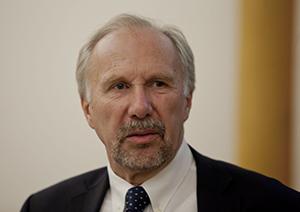Governor of Austrian Central Bank Lectures at Columbia Law School
Ewald Nowotny Discusses European Banking Policies and Other Topics in Presentation Moderated by Columbia Law School Professor Katharina Pistor
New York, October 23, 2013—A proposed Europe-wide banking union faces a number of difficult political obstacles, according to Ewald Nowotny, the governor of Austria’s central bank and a member of the Governing Council of the European Central Bank, in an Oct. 14 talk at Columbia Law School.
Nowotny, who arrived in New York after speaking with his counterparts at the International Monetary Fund’s headquarters in Washington, D.C., said a European
banking union is unlikely although there has been demand for the issuance of a single European bond guaranteed by all member countries. Northern European countries with stronger economies are unlikely to sign on to guarantee the issuance of any debt by financially weaker countries. The current banking union proposal is already facing its detractors in Germany and Great Britain.
| Ewald Nowotny |
“These are uncharted waters,” Nowotny said. “We have had no practical experience with this, and we have no political agreement to commit to this at the European scale. We are reaching the legal limits of banking policies.”
Despite the reservations of some countries for further integration, the survival of the Eurozone is no longer in question—a sign of optimism since the 2008 financial crisis, Nowotny said.
In his presentation, which was moderated by Columbia Law School Professor Katharina Pistor, Nowotny also discussed austerity measures in Greece and Spain and the need for more comprehensive criteria to assess EU candidate countries.
Although central banking policy is not intensively studied in the legal curriculum, Pistor, the Michael I. Sovern Professor of Law, said she hoped the discussion illuminated for students just “how deeply legal monetary policy is.”
Nowotny’s appearance was sponsored by the Center on Global Legal Transformation, which Pistor directs, and the European Legal Studies Center.
